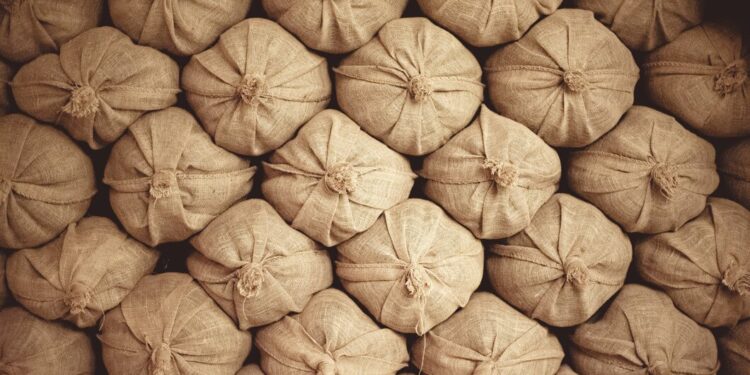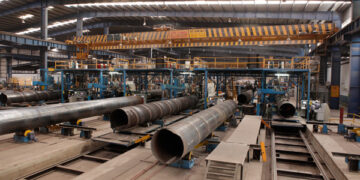GLOSTER LIMITED
Gloster Limited was incorporated in 1923 as Kettlewell Bullen & Company Ltd. In 1954, the company was acquired by Kolkata based Bangur family. The jute division was demerged into a separate entity and renamed as Gloster Limited in 1992. The company is engaged in the manufacturing of various kind of jute & jute allied products such as hessian, yarn, sacking woven & non-woven jute geo textiles, treated fabric-rot proof, fire retardant, hydrocarbon free jute bags, Jute leno fabrics and lifestyle products such as floor covering, furnishing, fabrics etc. The company has also added new technical products namely bags & laminated jute fabrics etc. The manufacturing unit is located in Howrah, West Bengal. Currently, the company is managed by Mr. Hemant Bangur.
Subsidiaries
Gloster Limited has following fully owned subsidiaries. Together with these subsidiaries Gloster Limited is referred as Gloster Group.
-Gloster Lifestyle Limited(GLL)
-Gloster Specialties Limited(GSL),
-Gloster Nuvo Limited(GNL)
-Network Industries Limited(NIL)
-Forte Gloster Industries Limited(FGIL).
Major Domains of Operations
Gloster Limited has an operational record of around hundred years as the company is operational since 1923. The group caters to both domestic and overseas markets such as USA, European Union, Middle East countries, Australia, Japan among others. The company has three major product segments namely Hessian & sacking, Yarn, and diversified jute products. Government sacking contributes nearly 30 percent of total revenue which is a regulated business. The group has wide product profile which caters to various industries such as FMCG, Agricultural products, Fashion Textile etc. The current management has more than six decades of experience in the jute business. The group has undertaken a large expansion plan in GNL to enhance its production capacity. In Phase I, group will add a capacity of 92 tons per day envisaging a capex of Rs 252 Cr. which was earlier expected to be operational by Q4FY23 but currently the phase I commissioning date is extended to Q3FY24 as the company faced difficulties in procuring plant and machinery from Thailand. In Phase II, the group will add another capacity of 46 tons per day involving a capex of Rs 61 Cr. The capacity in Phase II is expected to be operational by Q4FY24. The group is expected to show a healthy revenue growth over the medium term backed by capacity addition and healthy order flow from the overseas markets.
Business Diversification Plan
The group is planning to enter into industrial cable business through FGIL. The group had acquired FGIL from NCLT against a consideration of Rs 72 Cr. The group had undertaken a capex plan of Rs 79 Cr to upgrade and modernize the manufacturing facility of FGIL. This will diversify the group’s overall business profile and improve the revenue mix.
On land owned by FGIL, Gloster Ltd plans to set up a bag facility with a daily capacity of 1 lac bags for a capex of 35 crore to be funded by bank loans totaling 10 crore and rest through internal funding. The project should be finished by Q4FY24. The group is developing the jute project on the surplus land owned by FGIL.
Latest Development
The Cabinet Committee on Economic Affairs chaired by Hon’ble Prime Minister, Shri Narendra Modi, has approved reservation norms for mandatory use of jute in packaging for the Jute Year 2023 -24 (1st July, 2023 to 30th June, 2024) on 8th December, 2023. The Mandatory packaging norms approved for Jute Year 2023-24 provide for 100% reservation of the foodgrains and 20% of sugar to be compulsorily packed in jute bags.
The reservation norms in present proposal would further protect the interest of domestic production of raw jute and jute packaging material in India, thereby, making India self-reliant in consonance with Aatmanirbhar Bharat. Reservation for packaging in jute packaging material consumed around 65% of the raw jute produced in the country (in 2022-23). By bringing into effect the provision of JPM Act, the Government will provide relief to 4 lakh workers employed in jute mills and ancillary units as well as support the livelihood of around 40 lakh farm families. Besides, it will help protect environment because jute is natural, bio- degradable, renewable and reusable fibre and hence fulfils all sustainability parameters.
75% of the total production of the Jute Industry is Jute Sacking Bags of which 85% is supplied to the Food Corporation of India (FCl) and State Procurement Agencies (SPAs) and remaining is exported/sold directly. Government of India purchases Jute sacking bags worth approximately Rs. 12,000 crore every year for packing of foodgrains, hence ensures guaranteed market for the produce of Jute Farmers and Workers.
Average Production of Jute Sacking Bags is about 30 lakhs bales (9 lakh MT) and Government is committed to ensure complete off-take of the sacking production of the jute bags in order to protect the interest of Jute farmers, workers and persons engaged in the Jute Industry.
Key Financial Highlights- H1 FY24
– Revenue from operations for H1FY24 stood at ₹ 324.46 crore against 373.68 crore last year, down 13.17 % (YoY).
– PBT for H1FY24 at ₹ 21.62 crore against 45.46 crore last year, down 52.44 % (YoY).
– PAT including other income for H1FY24 stood at ₹ 24.50 crore against 35.73 crore last year, lower by 31.43 % (YoY).
– EPS for H1FY24 is ₹ 13.25 per share against 30.68 last year of a face value of ₹ 10 each. Bonus shares in the ratio of 1:1 was issued as per decision of Extra Ordinary GBM 02.12.2022. Hence EPS figures will be diluted to that extent.
– Current market capital is 1028 crore. Book Value is 988.
Major Risk Factors
-Jute is an agricultural product, and its supply is highly dependent on weather conditions. There are variations in prices and quality from season to season. As raw material cost is a major component of the total cost, any price rise affects the profitability of jute companies.
-High Working capital requirement on account of high Inventory Days and receivable days.


















